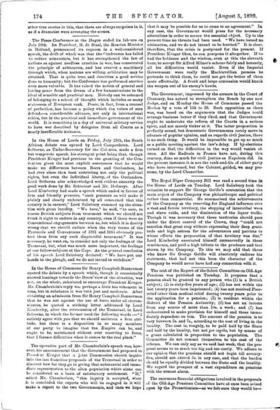The Peace Conference at the Hague ended its labours on
July 29th. Its President, M. de Steal, the Russian Minister in Holland, pronounced its requiem in a well-considered epeech, the drift of which was that the Conference has failed to reduce armaments, but it has strengthened the law of nations as against needless cruelties in war, has consecrated the principle of arbitration, and has created a machinery through which, when nations are willing, arbitration may be obtained. That is quite true, and describes a good service done to humanity; but the Conference has performed another even more valuable. It has raised the notion of general and lasting peace from the dream of a few humanitarians to the ideal of sensible and practical men. Nobody can be ashamed of belonging to a school of thought which includes so many statesmen of European rank. Peace, in fact, from a counsel of perfection, has become a policy which the rulers of men defend;—a considerable advance, not only in international ethics, but in the practical and immediate government of the world. It is something in a day of universal military service to have war described by delegates from all Courts as a nearly insufferable nuisance.


































 Previous page
Previous page